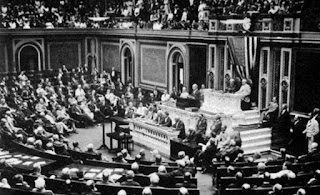FK Action Project for "Policy" Unit#2/3 " Was WW1 Legal?"
Hello reader,
As part of my "Policy" class at GCE Lab School, I had the opportunity to explore the Executive and Judicial branches of the US government and their historical context. Our class had the opportunity to learn about the role of the consulting firm Deloitte in politics and to visit the Dirksen Federal Courthouse to better understand these concepts in practice. Inspired by these experiences, I chose to investigate the legality of wars throughout American history. I researched several historical conflicts, focusing on World War 1 and examined a Supreme Court ruling at the time to determine whether this war was deemed "legal" by the Supreme Court. Through this project, I gained a better understanding of the role of the Supreme Court in interpreting the Constitution and the laws of the land, as well as the complex interplay between the different branches of government and the changing social and political contexts in which they operate. Enjoy!
Was World War 1 legal in the eyes of the US Supreme Court? The US got involved in WWl when President Woodrow Wilson asked Congress to declare war, and the US started to send support to the Allies, who were fighting against Germany and Austria-Hungary.
-Woodrow Wilson Asking Congress to Declare War
To find out if it was legal we must look at a similar case. There was a court case in 1863 called the Prize Cases where they decided if President Lincoln could stop trade and transport with the Confederate states during the Civil War. The Court said the President could do it even though Congress didn't declare war. It was allowed because it was necessary to protect the country. This means the President has power during war or national emergency. It was used in other court cases later on too.
The Prize Cases showed a balance between staying safe and leaving people alone. The decision also influenced international law. Even though World War 1 was different, people used the Prize Cases as a reason for America being involved.
One key quote from the Prize Cases is "When a war actually exists with a foreign nation, there is no difficulty in finding and applying the definition of blockade as understood and practiced by modern commercial nations." This quote emphasizes the Court's belief that the use of a naval blockade was justified during times of war, as it was a well-established practice among nations. It also highlights the Court's willingness to defer to customary international law in determining the legality of military actions during war.
The Prize Cases established that the President has broad discretionary powers to take actions in the interest of national security during times of war or national emergency. This ruling has set a precedent for the extent of presidential power in matters of national defense, and has been cited in several subsequent court cases. For instance, the Supreme Court decision in Hamdi v. Rumsfeld (2004) references the Prize Cases in discussing the President's authority to detain US citizens as enemy combatants. The Prize Cases decision also highlights the balance between national security and individual liberties. While the Court upheld Lincoln's use of a naval blockade as a necessary measure in defense of the country, it also acknowledged the potential infringement on the rights of citizens. This balance is still being debated today, particularly in the context of government surveillance and the use of force against suspected threats to national security.
One thing that the US did during the war was something called the Espionage Act. This was a rule made to protect military operations and national security during the war. The Act said that people could get in trouble if they tried to stop people from joining the military, if they made it hard for the military to work, or if they said anything bad about the war effort. This included things like sharing secrets about the military or saying stuff that made people not want to fight in the war.
The Espionage Act ended up causing problems, though. People who disagreed with the war were being put in jail, and people weren't able to say what they thought. Lots of people who didn't like the war, including labor leaders and pacifists, were arrested and put away. This made people start to question if the Act was a good idea, since it was taking away people's freedom of speech and making them scared to share their opinions.
Even though people had different opinions about the war, America eventually became really involved and helped to win the war. After the war was over, America also helped to create the League of Nations, which was an organization meant to promote cooperation and peace between countries. So in the end was it legal? Yes.
Citations:
1. "The Prize Cases and Presidential Power: A Legal Study." By Robert J. Kaczorowski. Journal of American History, vol. 66, no. 1, 1979, pp. 75–93. JSTOR, www.jstor.org\/stable\/1895434.
2. "The Espionage Act and the First Amendment: The Supreme Court's Declining Defense of Free Speech." By David M. O'Brien. Journal of Supreme Court History, vol. 44, no. 3, 2019, pp. 307–326.
3. "Hamdi v. Rumsfeld and the Prize Cases: Military Detention and Presidential Power." By Christopher D. Stone. Harvard Law Review, vol. 119, no. 7, 2006, pp. 1901–1927. JSTOR, www.jstor.org\/stable\/20455705.
4. "World War I and the Creation of the League of Nations." By Richard S. Faulkner and T. David McClelland. The History Teacher, vol. 48, no. 1, 2014, pp. 25–44. JSTOR, www.jstor.org\/stable\/10.2307\/24390975.
5. Silbey, Joel H. The Prize Cases: Significance, Briefing and Text. New York University Press, 1970.


Comments
Post a Comment